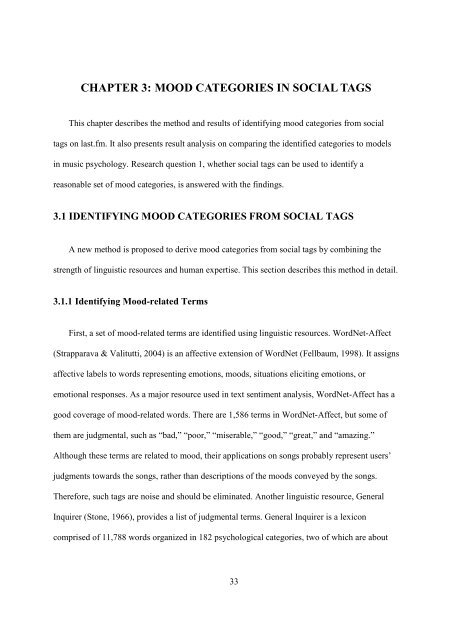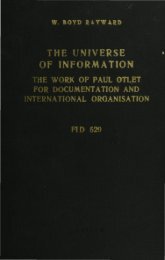improving music mood classification using lyrics, audio and social tags
improving music mood classification using lyrics, audio and social tags
improving music mood classification using lyrics, audio and social tags
You also want an ePaper? Increase the reach of your titles
YUMPU automatically turns print PDFs into web optimized ePapers that Google loves.
CHAPTER 3: MOOD CATEGORIES IN SOCIAL TAGS<br />
This chapter describes the method <strong>and</strong> results of identifying <strong>mood</strong> categories from <strong>social</strong><br />
<strong>tags</strong> on last.fm. It also presents result analysis on comparing the identified categories to models<br />
in <strong>music</strong> psychology. Research question 1, whether <strong>social</strong> <strong>tags</strong> can be used to identify a<br />
reasonable set of <strong>mood</strong> categories, is answered with the findings.<br />
3.1 IDENTIFYING MOOD CATEGORIES FROM SOCIAL TAGS<br />
A new method is proposed to derive <strong>mood</strong> categories from <strong>social</strong> <strong>tags</strong> by combining the<br />
strength of linguistic resources <strong>and</strong> human expertise. This section describes this method in detail.<br />
3.1.1 Identifying Mood-related Terms<br />
First, a set of <strong>mood</strong>-related terms are identified <strong>using</strong> linguistic resources. WordNet-Affect<br />
(Strapparava & Valitutti, 2004) is an affective extension of WordNet (Fellbaum, 1998). It assigns<br />
affective labels to words representing emotions, <strong>mood</strong>s, situations eliciting emotions, or<br />
emotional responses. As a major resource used in text sentiment analysis, WordNet-Affect has a<br />
good coverage of <strong>mood</strong>-related words. There are 1,586 terms in WordNet-Affect, but some of<br />
them are judgmental, such as “bad,” “poor,” “miserable,” “good,” “great,” <strong>and</strong> “amazing.”<br />
Although these terms are related to <strong>mood</strong>, their applications on songs probably represent users’<br />
judgments towards the songs, rather than descriptions of the <strong>mood</strong>s conveyed by the songs.<br />
Therefore, such <strong>tags</strong> are noise <strong>and</strong> should be eliminated. Another linguistic resource, General<br />
Inquirer (Stone, 1966), provides a list of judgmental terms. General Inquirer is a lexicon<br />
comprised of 11,788 words organized in 182 psychological categories, two of which are about<br />
33
















